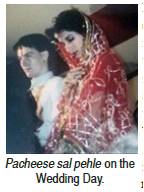By Jeremy Levy, Â Â e-mail:Â jlevy@pitt.edu
Jeremy Levy is the director of Pittsburgh Quantum Institute and a Distinguished Professor in the Department of Physics and Astronomy at the University of Pittsburgh. Here he reminisces about his wedding to his Indian bride, twenty-five years ago in Patna, India, and talks about some changes that have engulfed Indians in India between then and now.
Twenty-five years ago, almost to the day, my fiancée Chandralekha and I, along with my parents, brother and a few friends, stepped off of a plane in Patna, the capital city of Bihar in northern India. Days later, we were married. Our mid-June wedding coincided precisely with the arrival of the monsoon in Patna. The steady downpour wreaked havoc on the logistics of the essential marriage functions. But in India, it is a good omen for weddings. I sat on a canopy-protected stage, sipping Thums Up soda, waiting for my bride to arrive. Meanwhile, foreign bacteria marched unopposed through my intestines, setting up shop. Auto rickshaws ambled along the narrow, flooded streets of Patna, succumbing every now and then to tub-deep potholes.
Before coming to India, I knew nothing about Hindu weddings or day-to-day customs. And yet, I was anything but a tourist. There are two basic ways to greet and say farewell to someone. If it is a friend of the family or a stranger, you hold your hands, hath jhoad ke, clasping gently the two palms facing each other, and say namaste. But if it’s a relative you say pranam. And if the relative is very senior to you, you should (to be safe) do pear chew-ke pranam, an added measure of respect. Basically, you dive at their feet. It wasn’t long before I mastered the basic dive sequence. I had no idea who anyone was, so I dove at everyone: parents, grandparents, aunts, uncles, neighbors, cousins, maidservants.
That’s the mechanics of respect. But how is that really respectful? The concept of true respect quickly disintegrates when you try to pick it up and mentally isolate it. Ultimately, you just know when someone is giving you respect or not. I realized that respect isn’t really about the diving motion at all. It is a state of mind.
Twenty-five years after my own wedding, my niece Chayanika was having hers. Though it’s a Hindi movie cliché, that’s how I replay it in my mind: a shy two-year-old trash-talks as I try to push her on a swing, saying marengay (I’ll hit you). She responds: nani ke pas jayenge (I’ll go to my grandma and tell on you), and meri maa ka-han hai (where is my mother when I need her?).
cliché, that’s how I replay it in my mind: a shy two-year-old trash-talks as I try to push her on a swing, saying marengay (I’ll hit you). She responds: nani ke pas jayenge (I’ll go to my grandma and tell on you), and meri maa ka-han hai (where is my mother when I need her?).
Cut to: the beautiful bride’s arm, gracefully extended toward the mehandi wala (mehandi artist). She looks up slowly, smiles. I snap a photograph. Or rather, 30 shots each second.
One of the changes I witnessed over the past 25 years in India is the increasing encroachment of television into the daily lives of youngsters, housewives, and especially retirees. When I arrived in Patna, the family had a small black-and-white TV that received a single station — Door Darshan One. Now, large flat-screen TVs are ubiquitous among the middle and upper-middle class. They stock a quantity of channels putting the US to shame. More Hindi “soaps†are produced in India than in the US, exceeding even the Bollywood-to-Hollywood ratio of films produced annually.
In retirees’ homes, the TV is always, always, on. The main couch usually faces a flat LCD TV screen that relentlessly telecasts a soap, a news program, a Bollywood music video montage, or religious serial. When guests come, the TV stays on at full volume throughout the visit. They have become so inured to lights and sounds that people no more regard them as distractions. And of course it looks disrespectful to even get close to their remote and try to fumble with the buttons.
usually faces a flat LCD TV screen that relentlessly telecasts a soap, a news program, a Bollywood music video montage, or religious serial. When guests come, the TV stays on at full volume throughout the visit. They have become so inured to lights and sounds that people no more regard them as distractions. And of course it looks disrespectful to even get close to their remote and try to fumble with the buttons.
I Â sit on the couch that faces the big screen. The bright colorful display blinks and bleats while I mentally prepare to speak with our hosts
that faces the big screen. The bright colorful display blinks and bleats while I mentally prepare to speak with our hosts . My non-native Hindi has sputtered its way across a quarter century of stroboscopic practice. I am exposed to India like light to celluloid in a film projector. The spindle advances the frame, click. The shutter opens, allowing light to pass for all too-brief a period of time, then closes again. Time starts up again until the next frame.
. My non-native Hindi has sputtered its way across a quarter century of stroboscopic practice. I am exposed to India like light to celluloid in a film projector. The spindle advances the frame, click. The shutter opens, allowing light to pass for all too-brief a period of time, then closes again. Time starts up again until the next frame.
I sit on the couch that faces the big screen TV. Twenty slow-motion frames of Salman Khan, a convicted homicidal criminal, document his skulk from car to court house. I am forced to watch.
Mausaji, the patriarch of the family we were visiting, sits cross-legged at right angles to both me and the TV. My eyes dart toward him, to the other silently seated guests, and then come to rest on the TV. It’s a commercial for Lux, a detergent.
“Raju, take a look at this photograph.â€Â The voice is Mausaji’s.  He is not addressing me, but rather my brother-in-law, who also came from the US for the wedding. My wife’s older brother happily gets up.
I also head toward the photograph that is mounted behind me in a wooden cabinet with glass windows. The large, black-and-white photograph features a tall teenage boy towering over a pre-teen girl.
windows. The large, black-and-white photograph features a tall teenage boy towering over a pre-teen girl.
“That’s our wedding photograph, taken fifty years agoâ€, says Mausaji. He was eighteen, his bride was eleven. Right below this photograph is a second, equally large color picture. She is nearly as tall as him. He is content. She is smiling. They are both fifty years older.
I am completely, completely, transfixed by these two photographs. They sear into my memory. My eyes dart up, down, up, down, creating the most basic of all movie loops — black-and-white, color, black-and-white, color… Soft, sharp, soft, sharp… Fast-forward, rewind, fast-forward, rewind… Time compresses a billion-fold.
loops — black-and-white, color, black-and-white, color… Soft, sharp, soft, sharp… Fast-forward, rewind, fast-forward, rewind… Time compresses a billion-fold.
At some point, I snap out of my trance. What do I say to Mausaji? I carefully utter the single Hindi sentence that is looping in my mind: “Twenty five is half of fifty.â€Â It is more alliterative in Hindi: “Pachees pachaas ka adha hai.â€
Mausaji immediately catches what I was relating to. He beams, “I remember your wedding well. Ah! The pouring rain!â€
♣



